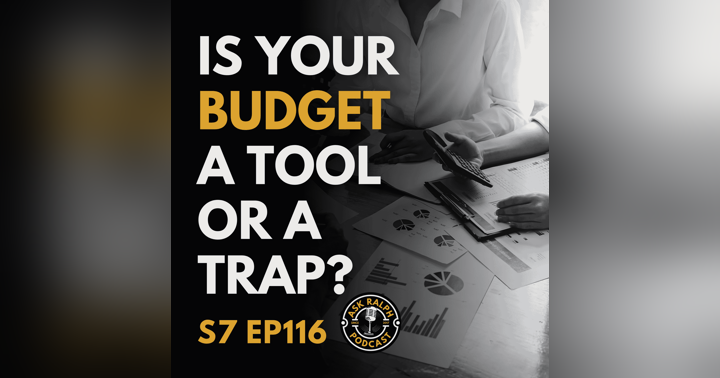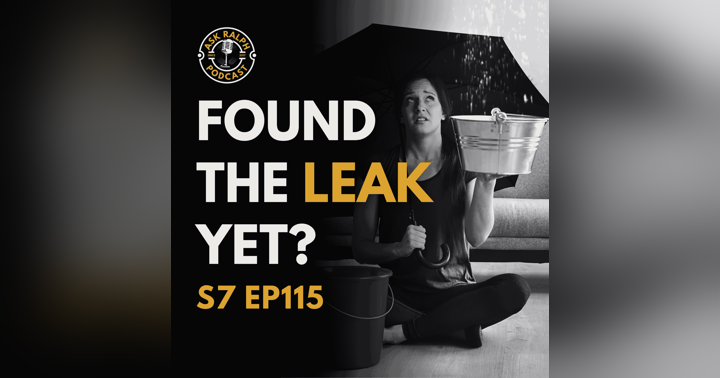Is Your Family Safe from Inheriting Your Debt?

What Happens to Your Debt When You're No Longer Here?
Imagine this: you've just lost a loved one, and amidst the grief and emotional turmoil, you're suddenly faced with the daunting task of sorting through their finances. To your surprise, you discover a mountain of debt that you never knew existed. This scenario, unfortunately, is all too common. It highlights the importance of understanding what happens to our financial obligations when we pass away, a topic that holds particular significance for Christians who strive to be responsible stewards of their resources. As you reflect on your own financial legacy, it’s worth asking—Is Your Family Safe from Inheriting Your Debt?
Check out the full podcast episode:
In this blog post, we'll delve into the intricacies of debt after death, exploring both the legal and financial implications. We'll also examine the biblical principles that guide us toward financial responsibility and leaving a legacy that honors God.
What Happens to Debt After Death?
When someone passes away, their debts don't simply vanish. Instead, these obligations become the responsibility of their estate. An estate encompasses all the assets an individual possessed at the time of their death, including bank accounts, real estate, personal belongings, and investments1. It's crucial to maintain meticulous records of all assets and debts to simplify the process for the executor, the person designated to manage the estate2.
The executor, typically named in the will, assumes the responsibility of settling the estate's debts before distributing any remaining assets to the beneficiaries1. If the estate holds sufficient assets to cover the debts, the executor will utilize those resources to settle the outstanding obligations. However, if the estate's assets fall short of covering the debts, it is deemed "insolvent." 3 In such cases, the debts may be partially paid, or, if there are no assets at all, they may go unpaid4. Sometimes, specific assets may need to be sold to generate the necessary funds to cover the outstanding debts4.
It's important to note that there are exceptions to this general rule. For instance, if you co-signed a loan with the deceased, you might be held liable for the debt. Similarly, in community property states, a surviving spouse may be responsible for their deceased spouse's debts, even if they didn't co-sign the loan5. Navigating these complexities often requires the expertise of a debt resolution attorney who can provide guidance and ensure compliance with state laws2.
How Different Types of Debt Are Handled After Death
The handling of debt after death varies depending on the type of debt in question. Here's a breakdown of how some common types of debt are typically managed:
|
Debt Type |
Handling After Death |
Important Considerations |
|
Mortgages |
If there's a co-borrower, they become responsible. If the deceased was the sole borrower, the estate is responsible6. |
Contact the mortgage company immediately after the borrower's death to avoid misunderstandings7. Heirs inheriting a property with a mortgage have options like assuming the mortgage, refinancing, or selling the property6. |
|
Credit cards |
Typically paid off from the estate8. |
In community property states, surviving spouses may be responsible for their deceased spouse's credit card debt3. |
|
Student loans |
Federal student loans are generally discharged upon the borrower's death9. |
Private student loans may or may not be discharged, depending on the lender and the loan terms10. Some private lenders have an "automatic default policy" where the entire loan balance becomes due if the cosigner dies11. |
Using Life Insurance to Cover Debts After Death
Life insurance can be a valuable tool in managing debt after death. It provides a death benefit that can be used to settle outstanding debts, such as mortgages, credit cards, and personal loans12. This can help protect your loved ones from inheriting your debts and ensure they have the financial resources to cover expenses.
When selecting a life insurance policy for debt coverage, it's essential to choose the right type and amount of coverage. Term life insurance offers coverage for a specific period at a more affordable rate, while whole life insurance provides lifelong coverage and accumulates cash value over time12. This cash value can be accessed during your lifetime through a policy loan to address debt12.
Estate Planning and Debt Management
Estate planning plays a crucial role in managing debt after death. A well-structured estate plan ensures that your debts are settled and your assets are distributed according to your wishes. Here are some key estate planning tools:
- Will: A will is a legal document that outlines the distribution of your assets after your death and designates an executor to manage your estate. Having a will is crucial to avoid complications in debt settlement and ensure that your wishes are honored7.
- Trust: A trust is a legal arrangement that allows you to transfer assets to a trustee who will manage them for your beneficiaries. Trusts can be used to avoid probate and potentially offer some protection of assets from creditors, depending on the type of trust and applicable laws13.
In your estate plan, it's vital to review and update beneficiary designations on life insurance policies and retirement accounts to ensure they align with your current wishes13. Additionally, be aware that the IRS may hold the executor responsible if estate taxes aren't prioritized in debt settlement2.
Real-Life Examples
The challenges of dealing with debt after the death of a loved one are often more profound than we anticipate. Consider the story of a widow who found herself struggling with mounting debt after her husband's passing. Despite receiving life insurance proceeds and having a retirement account, the expenses associated with her husband's illness and maintaining their home quickly depleted her savings15.
To cope with the financial strain, she resorted to using credit cards, accumulating significant debt. Embarrassed and overwhelmed, she kept her struggles hidden from her children until the burden became unbearable. Eventually, with the support of her daughter, she sought help from a debt relief company that consolidated her payments, negotiated with creditors, and helped her regain control of her finances15. This example underscores the importance of seeking professional guidance and exploring available resources when facing overwhelming debt.
What Does the Bible Say About Debt?
The Bible provides valuable insights into debt and financial responsibility. Here are some key principles to consider:
- Exercise caution with debt: Proverbs 22:7 states, "The rich rule over the poor, and the borrower is slave to the lender." 16 This verse emphasizes the potential dangers of debt and encourages us to approach it with extreme caution. Debt can create a sense of bondage and limit our financial freedom, hindering our ability to serve God and others fully.
- Be a faithful steward: As Christians, we are entrusted with managing God's resources wisely. This includes being responsible with our finances and avoiding unnecessary debt17. The Bible warns against acting as a guarantor for someone else's debt, as this can lead to financial burdens and potential servitude18.
- Fulfill your obligations: If you do incur debt, it's crucial to repay it promptly and in full. Psalm 37:21 says, "The wicked borrows but does not pay back, but the righteous is generous and gives." 16 Honoring our financial commitments reflects our integrity and commitment to biblical principles.
- Trust in God's provision: Instead of relying on debt to fulfill our desires, we should seek God's guidance and trust in His provision18. Proverbs warns against "surety," which refers to making a pledge without a sure way of fulfilling it19. This highlights the importance of seeking God's will and trusting in His plan for our lives, rather than presuming on the future through debt.
Conclusion
While death is a difficult subject to confront, understanding the implications of debt after death is crucial for responsible financial stewardship. By taking proactive steps to manage our finances, we can protect our loved ones and leave a legacy that honors God.
Here are some key takeaways to guide your financial planning:
- Create a comprehensive estate plan: This includes a will, and potentially a trust, to ensure your assets are distributed according to your wishes and your debts are settled efficiently.
- Consider life insurance: Life insurance can provide a financial safety net for your loved ones, helping them cover debts and expenses after your passing.
- Communicate openly with family: Discuss your financial situation with your loved ones to avoid surprises and potential conflicts after your death.
- Follow biblical principles: Seek God's guidance in your financial decisions, avoid unnecessary debt, be a faithful steward of your resources, and trust in His provision.
By integrating these principles into our lives, we can approach our finances with wisdom and integrity, leaving a legacy of faith and financial responsibility for future generations.
Works cited
- What Happens to Debt When You Die - Ramsey Solutions, accessed February 22, 2025, https://www.ramseysolutions.com/debt/what-happens-to-your-debt-when-you-die
- Who is responsible for debt after death? - MassMutual Blog, accessed February 22, 2025, https://blog.massmutual.com/planning/do-debts-die-with-you
- Debt After Death: What You Need to Know, accessed February 22, 2025, https://www.incharge.org/debt-relief/debt-management/debt-death-credit-card-mortgage-student-loan-debt-after-death/
- What happens to debts after death | Cancer Council, accessed February 22, 2025, https://www.cancer.org.au/assets/pdf/what-happens-to-debts-after-death
- Does a person's debt go away when they die? | Consumer Financial Protection Bureau, accessed February 22, 2025, https://www.consumerfinance.gov/ask-cfpb/does-a-persons-debt-go-away-when-they-die-en-1463/
- What Happens To Your Mortgage When You Die? | Bankrate, accessed February 22, 2025, https://www.bankrate.com/mortgages/what-happens-to-your-mortgage-when-you-die/
- What Happens to Your Mortgage When You Die? - Griffin Funding, accessed February 22, 2025, https://griffinfunding.com/blog/mortgage/what-happens-to-your-mortgage-when-you-die/
- What Happens to Credit Card Debt When You Die? - Chase Bank, accessed February 22, 2025, https://www.chase.com/personal/credit-cards/education/basics/credit-card-debt-after-death
- studentaid.gov, accessed February 22, 2025, https://studentaid.gov/help-center/answers/article/what-happens-if-borrower-dies#:~:text=If%20a%20borrower%20dies%2C%20their,responsible%20for%20repaying%20the%20loans.
- Student Debt After Death - ABA Insurance Program, accessed February 22, 2025, https://www.abainsurance.com/resource-center/education-center/student-debt-after-death/
- What happens to student loans if you die? - Earnest, accessed February 22, 2025, https://www.earnest.com/blog/what-happens-to-student-loans-when-you-die/
- Does Life Insurance Pay Off Debt? - American Life Fund, accessed February 22, 2025, https://www.americanlifefund.com/does-life-insurance-pay-off-debt/
- How To Handle Your Estate Planning When A Large Amount of Debt Is Involved, accessed February 22, 2025, https://jgcg.com/how-to-handle-your-estate-planning-when-a-large-amount-of-debt-is-involved/
- Understanding Estate Responsibility for Debts After Death: Trusts, Time Limits, and International Debt | Geiger Law Office, accessed February 22, 2025, https://www.geigerlawoffice.com/blog/understanding-estate-responsibility-for-debts-after-death-trusts-time-limits-and-international-d.cfm
- Surviving a Husband's Death and the Aftermath of Debt, accessed February 22, 2025, https://www.incharge.org/debt-relief/credit-counseling/success-stories/surviving-a-husbands-death-and-the-aftermath-of-debt/
- What the Bible Says About Debt - Stewardship - Real Estate, Home Loan, Insurance, and Financial Advisors, accessed February 22, 2025, https://stewardship.pro/2022/03/01/what-the-bible-says-about-debt/
- God's Ways of Managing Money - Ramsey Solutions, accessed February 22, 2025, https://www.ramseysolutions.com/personal-growth/managing-money-gods-way
- The Biblical View of Debt: Wisdom, Warnings, and Guidance | ThePreachersWord, accessed February 22, 2025, https://thepreachersword.com/2025/02/20/the-biblical-view-of-debt-wisdom-warnings-and-guidance/
- What Does the Bible Say About Debt? - Christian Stewardship Network, accessed February 22, 2025, https://www.christianstewardshipnetwork.com/blog/2021/4/16/what-does-the-bible-say-about-debt












